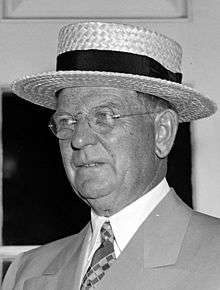Edward Joseph Kelly
| Edward Joseph Kelly | |
|---|---|
 | |
| 46th Mayor of Chicago | |
|
In office April 8, 1933 – 1947 | |
| Preceded by | Frank J. Corr |
| Succeeded by | Martin H. Kennelly |
| Personal details | |
| Born |
May 1, 1876 Chicago, Illinois, U.S. |
| Died |
October 20, 1950 (aged 74) Chicago, Illinois, U.S. |
| Political party | Democratic |
| Residence | Chicago, Illinois, U.S. |
| Religion | Roman Catholic |
Edward Joseph Kelly (May 1, 1876 – October 20, 1950) served as chief engineer of the Chicago Sanitary District in the 1920s, and later as mayor of Chicago, Illinois (1933–1947); he was a Democrat.
Born to Stephen and Helen (née Lang) Kelly, he was the first of five Chicago mayors from Bridgeport of Chicago's South Side.[1] Kelly was the chief engineer of the Chicago Sanitary District in the 1920s. He was sponsored by Patrick Nash, the owner of a sewer-contracting company that did millions of dollars of business with the city.[2] He subsequently became president of the South Park Board, a position that presided over the building of Soldier Field. Under his tenure Soldier Field cost $8 million, while a similar Los Angeles stadium only cost $1.7 million.[2]
Kelly was Mayor of Chicago during the 1933-34 Chicago World's Fair (Century of Progress) which took place during the Great Depression which included the successful playing of the first official Major League Baseball All-Star Game; Kelly initiated for holding a major sport event for the fair to the Chicago Tribune. Kelly was famous for banning Nelson Algren's 1942 book Never Come Morning, a novel, from the Chicago Public Library; the ban remained in force for decades due to the outcry by Chicago Polonia upon its release.[3]
Following the assassination of Mayor Anton Cermak, Kelly was hand-picked by his friend, Patrick Nash, Chairman of the Cook County Democratic Party, for the mayoral election of 1933.[4] Together, Kelly and Nash built one of the most powerful, and most corrupt, big city political organizations, called the "Kelly-Nash Machine". In 1947, Kelly acquiesced to the Cook County Democratic Party's decision to slate a candidate with reform credentials for mayor of Chicago and was succeeded by Martin H. Kennelly.
Death
Kelly died in 1950 and was interred in Calvary Cemetery, Evanston, Illinois.
See also
- Timeline of Chicago, 1930s-1940s
References
- ↑ "Political History of Bridgeport". University of Illinois - Chicago. Retrieved 2007-09-01.
- 1 2 "History of Chicago from Trading Post to Metropolis (Module 3 Chapter 2-Chicago During the Great Depression)". Roosevelt University. 2006. Archived from the original on 2007-09-27. Retrieved 2007-08-29.
- ↑ Reader Archive-Extract: 1998/981120/ALGREN
- ↑ "Edward J. Kelly Elected as New Mayor of Chicago – Takes Oath of Office After Action by City Council". Chicago Tribune. 1933-04-14. p. 38. Retrieved 2015-03-03.
| Political offices | ||
|---|---|---|
| Preceded by Frank J. Corr |
Mayor of Chicago 1933–1947 |
Succeeded by Martin H. Kennelly |